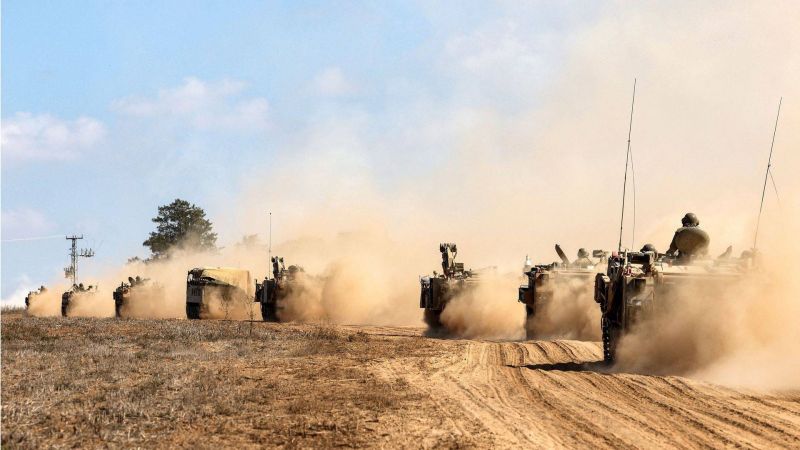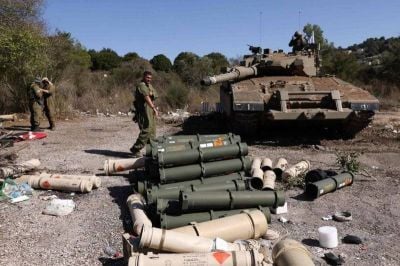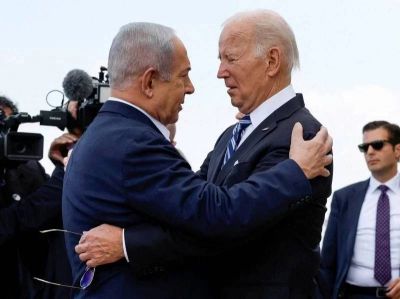
Israeli army tanks and vehicles deploying along the border with the Gaza Strip, Oct. 13, 2023. (Credit: Jack Guez/AFP)
Gaza Strip reduced to rubble, and then what? The imminent Israeli ground offensive on the Palestinian enclave has not even begun, and whole areas have been already devastated.
More than 5,000 inhabitants, including 2,000 children, have been killed in the past 18 days in Israeli bombardment, according to the Gaza Health Ministry.
Since Oct. 7, Israel has clearly stated its objective of “annihilating” the ruling Islamist movement.
The task is proving complicated. Whether it succeeds or not, there is one question that requires an answer. What will happen to the Palestinian territory?
So far, very little has been said on this subject by Israeli officials. However, the few statements that have been made seem to rule out two scenarios: a return to a prolonged occupation of the Gaza Strip as occurred from 1967 to 2005, and a return to the status quo.
On Friday, Israeli Defense Minister Yoav Gallant told the Knesset that the ultimate goal was “the removal of Israel’s responsibility for life in the Gaza Strip, and the establishment of a new security reality for the citizens of Israel,” and “for the region.”
After the withdrawal of its armed forces and settlers from the Palestinian enclave in 2005, Israel maintained control of the airspace, coastline and movement of people and goods in Gaza, and has imposed since 2007 a severe blockade that turned into a total siege during the current onslaught.
AFP quoted an anonymous source at the Israeli Foreign Affairs Ministry as saying that the country now wanted to “hand over the keys” of the Gaza Strip to a third party, perhaps in reference to Egypt.
Egyptian suspicions
“This has been an Israeli objective and fantasy for many decades,” said Hussein Ibish, a scholar at the Arab Gulf States Institute.
“But under no circumstances will Cairo allow itself to be drawn into direct involvement inside Gaza,” he added.
Israel’s preference is linked in particular to the fact that Egypt administered the Palestinian enclave from 1948 to 1967, is a signatory to a peace treaty with the Jewish state and is capable of controlling the territory’s security.
But Cairo, for its part, perceives the strip of land bordering the Sinai Peninsula and linked to it by the Rafah border crossing with suspicion, particularly since Hamas, a spin-off of the Muslim Brotherhood, came to power there in 2007 and has become despised by the regime of Abdel Fattah al-Sisi, which has hunted down Brotherhood members in Egypt.
“Israel is obsessed with the idea that someone has to govern and control the Palestinians with an iron fist, and it hopes that by persuading Egypt or someone else to do so, it will be able to wash its hands of any responsibility or the consequences of stifling the Palestinians and denying them their freedom,” said Omar Baddar, a Palestinian political analyst.
Cairo wants to stay out of the war in Gaza’s densely populated 362-square-kilometer territory, home to almost 2.4 million people, and is now seeking to avoid a mass influx of refugees into the country at all costs.
This exodus, in Egypt’s eyes, presents a twofold risk. First is that it will result in a permanent presence of refugees on its territory and that armed Palestinian movements will use it as a rear base to plan attacks against Israel, which would drag Egypt into a confrontation with the Jewish state.
Criticized by a segment of the Egyptian population for his economic policies and authoritarian trend, since 2013 President Sisi has built his political capital on the restoration of order in Sinai Peninsula, which faces a jihadist threat.
The possibility for Egypt to assume a direct role in Gaza will pose a threat to its political gains. And even though Egypt expressed willingness to assume this role, it will be hard to justify why to the international community
“Unlike the time when Egypt controlled the Gaza Strip, there are now, at least at international level, representative bodies of Palestinians: the Palestine Liberation Organization [PLO] and the Palestinian Authority [PA],” said Hamada Jaber, a consultant at the Ramallah-based Palestinian Center for Policy and Survey Research.
“This makes it difficult for Cairo to control the enclave,” he added.
Lack of political strategy
Another scenario would be the return to Gaza by the PA, which governs some areas of the occupied West Bank in coordination with Israel. But this option has many limitations in the eyes of the Jewish state.
Discredited by its population, the Palestinian leadership — tested for years by corruption, authoritarianism, inaction and accusations of collaboration with the Israeli occupier — is unable even to ensure control of some areas under its authority.
In recent months, Jenin and Nablus have seen an increase in the number of Palestinian fighters claiming to be independent of the main militant groups, in a context where the PA has abandoned maintaining public order. This climate of hostility would increase tenfold in Gaza, where the authorities in Ramallah would be exposed to attacks by the remaining Hamas and Islamic Jihad cells, reviving the spectrum of the bloody 2007 war.
Fatah, the big loser in the 2006 legislative elections and the main party within the PLO, had not digested the fact that Hamas had won. By the end of the fighting, the political rupture had been made. While Hamas took control of the Gaza Strip, the PA consolidated its power in the West Bank.
This would leave open the possibility of a group composed of powers such as Washington, the European Union, the United Nations, the Arab states and the PA working together to transfer control of the Palestinian enclave to the UN pending a more permanent solution.
This option would require an active role by the regional countries that would probably be reluctant to venture down this path without a commitment that it would enable the PA to gradually re-establish its control over Gaza.
In the eyes of several analysts, none of these options seem convincing. “I don’t think any party — UN peacekeepers, an Arab expeditionary force, the PA or anyone else — is prepared to take over after Israel has smashed Gaza into bits and do the dirty work of destroying attempts by Hamas or other extreme organizations to come back and begin to affirm their authority,” said Ibish.
According to him, Israel faces a choice it can’t make: “establishing a prolonged occupation of the interior of Gaza in order to eliminate these groups in the long term — which means fighting a Palestinian insurgency that will gradually wipe out Israeli conscripts and make life absolutely miserable in Tel Aviv — or reduce Gaza to rubble, leave and watch Hamas crawl out of the rubble and declare victory.”
These are uncertain and not very credible scenarios, which illustrate the absence of a long-term Israeli political plan for Gaza. While Israel’s military strategy is clear, there is no guarantee that the ideology and struggles to which Hamas subscribes will disappear.
“This is precisely why Israel is carrying out massive bombings, aimlessly and indiscriminately, while it is trying to formulate a sensible strategy,” said Baddar.
“But whether it tries to ethnically cleanse the Palestinians from Gaza or simply confines them to an even smaller area in the southern half of the Strip, the fundamental problem remains that millions of people under siege with no peaceful way out will find a way to react violently against their brutalization and confinement,” he added.
This article was originally published in French in L'Orient-Le Jour. Translation by Joelle El Khoury.


